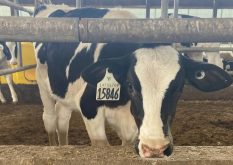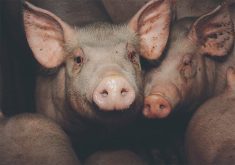There’s never been a better time for ag school grads.
“This job with DuPont Pioneer, I actually had basically guaranteed before Christmastime,” said Travis Elford, a recent University of Lethbridge graduate who grew up on a grain and sheep farm near Foremost.
Before he accepted his job as a field supervisor, Elford received five other offers from seed companies.
“It was extremely easy (to find a job). I had more offers to say no to than I looked for.”
Elford’s story isn’t unique.
Read Also

Economist outlines 3-point plan to reclaim agri-food dominance
An RBC policy analyst says the country is losing share in the global agri-food trade, but may be able to regain its status by diversifying.
There are currently more jobs in agriculture than there are graduates to fill them, said Josie Van Lent, dean of agriculture at Lakeland College.
“I’ve been in the ag industry professionally for well over 30 years, and I cannot think of a time when the job opportunities were this strong,” she said.
“If there’s a student who doesn’t have a job in ag, it’s because they’re being choosy. There are job opportunities for the majority of our students.”
The highest demand is for crop technology and agribusiness grads, but there’s no shortage of jobs on the livestock side.
- More from the Alberta Farmer Express: Job posting is ag are soaring
Maaike Van Kuilenburg said most of her friends in crop technology programs had snagged jobs long before she did, but she still had her job as a dairy consultant and sales rep with Cargill lined up in early January.
“In the animal industry, it was a lot slower,” said the recent graduate of the University of Alberta, who grew up on a dairy farm near Red Deer.
“Other companies started asking me to apply for them in January and February, but I already confirmed myself with Cargill.”
Crop service centres, retailers, and the banking sector are all scrambling to fill jobs, but the strong pull of corporate jobs for recent graduates and competition from other sectors is making it more difficult for producers to find workers.
“Farmers are facing intense challenges in finding farm labour,” said Debra Hauer, program manager at Canadian Agricultural Human Resources Council.
“Many of the recent grads are people who work in support services to industry, like input companies and sales and service.”
Traditionally, farmers have relied on their children to work on the farm, but with more young people turning to off-farm work after school, they have to widen their search.
“Farmers now have to go farther afield, away from family and community, in order to find people to work on their farms,” said Hauer.
About half of Lakeland College grads return to the family farm, but that isn’t an option for many students today.
Van Kuilenburg started school with the idea of one day taking over the family dairy, but the high cost of quota and land is a huge barrier.
“It’s difficult coming straight out of university with the debt and having no equity underneath you,” she said.
Employers are also having to change their expectations, said Van Lent.
“We do get quite a few requests for farm businesses looking for students in March, April, and May, and frankly by that time, many of them are already hired,” she said.
The demand is also a reflection of the educational system meeting the needs of industry, she added.
“We’re starting to see more requests for students with specific skill sets in primary agriculture,” she said.
“As an employer, you want it all. You want the smartest kid with the best attitude and a lot of practical experience. We’ve been encouraged by industry to continue with our programs, and our students have great job opportunities. That’s telling me the hands-on piece is valued.”
Practical experience is important, but completing a degree “will give you jobs you want,” said Elford.
He got a job after earning an agriculture science diploma from Lethbridge College, but found his advancement opportunities were limited, he said.
- More from the Alberta Farmer Express: Provincial agricultural education programs see enrolment boom
“I actually took some time off between my diploma and my degree, and I went back due to knowing that was my highest level I could achieve without going back to get my degree,” said Elford.
Having both a diploma and a degree is an advantage, he added.
“With the hands-on experience that a college provides — whether it’s in Lethbridge or Olds or Vermilion — you definitely have the upper hand on a strict four-year university program.”
Jose Puente agrees.
“It’s important to know the books, but it’s also important to have the technical skills,” said Puente, who just earned a master’s degree in animal science from the University of Alberta.
Puente came to Canada in 2007 through a partnership between his university in Mexico and Olds College, where he spent his last semester in the college’s meat-processing course.
“When I came to the University of Alberta, I was also hired as the meat-processing technician at the university,” said Puente, who grew up on a cattle farm.
“I had the hands-on experience from Olds College’s meat-processing course. When I went to the university, I was the only one who knew how to break down carcasses into cuts.”
Puente also worked for two years as a supervisor at Dairy Queen after he left Olds College — work experience that helped him land a job as a foreman trainee in JBS’s Approach Program.
“This program is for people who have previous experience as a supervisor,” he said. “Besides the technical skills that I got from Olds College and the U of A, the experience I had as a supervisor has helped me to be ahead of my competition.”
Being in JBS’s leadership program has shown Puente the opportunities that exist in Alberta’s agriculture industry.
“Right now, my managers and other managers I have met from other plants are about to retire. Those are opportunities that are going to come up,” he said. “The sky’s the limit.”
Elford also sees opportunities to move “up a company’s ladder” and take on a management role, but he also sees the option to start his own consulting business.
“I think in the industry in general, there’s so many companies to choose from to work for, but there’s also the ability to start up your own thing,” he said.
“The opportunities are absolutely endless. They’re definitely there for those who want to take them.”
In the past four years, AgCareers.com has seen almost a 50 per cent increase in the number of Canadian agriculture jobs posted to the popular job site. Here are the industries that are hiring.
1) General agriculture
2) Agronomy
3) Crop protection/ chemicals
4) Finance/banking
5) Seed
6) Crops/grain
7) Equipment/machinery
8) Feed
9) Commodities
10) Retail
Information courtesy of AgCareers.com’s 2013 Agribusiness Job Report.















